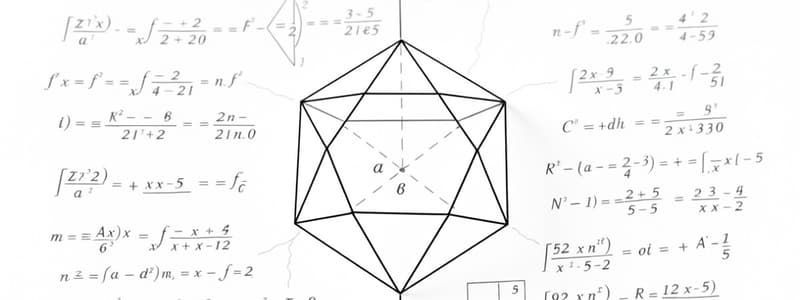Podcast
Questions and Answers
What is the midpoint formula?
What is the midpoint formula?
- (x1+x2/2, y1+y2/2) (correct)
- d = √[( x₂ - x₁)² + (y₂ - y₁)²]
- (x,y) = (-x,y)
- y=mx+b
What is the Distance Formula?
What is the Distance Formula?
d = √[( x₂ - x₁)² + (y₂ - y₁)²]
What is the slope formula?
What is the slope formula?
m = (y2 - y1) / (x2 - x1)
What is the Line Equation?
What is the Line Equation?
What is the reflection over the x-axis? Provide the formula.
What is the reflection over the x-axis? Provide the formula.
What is the reflection over the y-axis? Provide the formula.
What is the reflection over the y-axis? Provide the formula.
What is the reflection over the line y = x? Provide the formula.
What is the reflection over the line y = x? Provide the formula.
What is the reflection over the line y = -x? Provide the formula.
What is the reflection over the line y = -x? Provide the formula.
What is the reflection over the origin? Provide the formula.
What is the reflection over the origin? Provide the formula.
What is the reflection over a point (h, k)? Provide the formula.
What is the reflection over a point (h, k)? Provide the formula.
What does 'h' and 'k' refer to in translation?
What does 'h' and 'k' refer to in translation?
What is the formula for rotating a point 90 degrees?
What is the formula for rotating a point 90 degrees?
What is the formula for rotating a point 180 degrees?
What is the formula for rotating a point 180 degrees?
What is the formula for rotating a point 270 degrees?
What is the formula for rotating a point 270 degrees?
What is the formula for rotating a point -90 degrees?
What is the formula for rotating a point -90 degrees?
What is the formula for rotating a point -180 degrees?
What is the formula for rotating a point -180 degrees?
What is the formula for rotating a point -270 degrees?
What is the formula for rotating a point -270 degrees?
What does Dilation mean and what's the formula?
What does Dilation mean and what's the formula?
What does the sine function (SOH) represent?
What does the sine function (SOH) represent?
What does the cosine function (CAH) represent?
What does the cosine function (CAH) represent?
What does the tangent function (TOA) represent?
What does the tangent function (TOA) represent?
What is the Pythagorean Theorem?
What is the Pythagorean Theorem?
What is the Quadratic Formula?
What is the Quadratic Formula?
Flashcards are hidden until you start studying
Study Notes
Midpoint Formula
- Formula: ((x_1+x_2/2, y_1+y_2/2))
- Used to find the point that divides a line segment into two equal parts.
Distance Formula
- Formula: (d = \sqrt{(x_2 - x_1)^2 + (y_2 - y_1)^2})
- Calculates the straight line distance between two points in a Cartesian plane.
Slope Formula
- Formula: (m = \frac{y_2 - y_1}{x_2 - x_1})
- Determines the steepness or incline of a line, comparing changes in y and x.
Line Equation
- Formula: (y = mx + b)
- Represents a straight line where (m) is the slope and (b) is the y-intercept.
Reflection over x-axis
- Transformation: ((x, y) \rightarrow (x, -y))
- Inverts the y-coordinate, reflecting points across the x-axis.
Reflection over y-axis
- Transformation: ((x, y) \rightarrow (-x, y))
- Inverts the x-coordinate, reflecting points across the y-axis.
Reflection over y=x
- Transformation: ((x, y) \rightarrow (y, x))
- Swaps x and y coordinates, reflecting points across the line (y = x).
Reflection over y=-x
- Transformation: ((x, y) \rightarrow (-y, -x))
- Inverts both coordinates, reflecting points across the line (y = -x).
Reflection over origin
- Transformation: ((x, y) \rightarrow (-x, -y))
- Inverts both coordinates, reflecting points through the origin.
Reflection over h & k
- Transformation: ((x, y) \rightarrow (x + h, y + k))
- Moves points horizontally by (h) and vertically by (k).
Translation of h & k
- Definitions: (h) indicates horizontal movement, (k) indicates vertical movement.
- Shifts points in the Cartesian plane without changing their orientation.
Rotate 90 degrees
- Transformation: ((x, y) \rightarrow (-y, x))
- Rotates points 90 degrees counter-clockwise around the origin.
Rotate 180 degrees
- Transformation: ((x, y) \rightarrow (-x, -y))
- Rotates points 180 degrees, resulting in a direct inversion.
Rotate 270 degrees
- Transformation: ((x, y) \rightarrow (y, -x))
- Rotates points 270 degrees counter-clockwise or 90 degrees clockwise.
Rotate -90 degrees
- Transformation: ((x, y) \rightarrow (y, -x))
- Equivalent to rotating 270 degrees counter-clockwise.
Rotate -180 degrees
- Transformation: ((x, y) \rightarrow (-x, -y))
- Same effect as rotating 180 degrees.
Rotate -270 degrees
- Transformation: ((x, y) \rightarrow (-y, x))
- Rotates points 90 degrees clockwise.
Dilation
- Transformation: ((x, y) \rightarrow (kx, ky))
- Scales points from the origin by a factor (k), altering the size while maintaining shape.
Sine (SOH)
- Relationship: (\sin A= \frac{a}{c}, \sin B= \frac{b}{c})
- Inverse sine function: (\sin^{-1}) used to find angle measures.
Cosine (CAH)
- Relationship: (\cos A= \frac{b}{c}, \cos B= \frac{a}{c})
- Inverse cosine function: (\cos^{-1}) utilized for angle calculations.
Tangent (TOA)
- Relationship: (\tan A= \frac{a}{b}, \tan B= \frac{b}{a})
- Inverse tangent function: (\tan^{-1}) helps to determine angle measures.
Pythagorean Theorem
- Formula: (a^2 + b^2 = c^2)
- Relates the lengths of the sides of a right triangle, where (c) is the hypotenuse.
Quadratic Formula
- Formula: (x = \frac{-b \pm \sqrt{b^2 - 4ac}}{2a})
- Used to find the roots of a quadratic equation in the form (ax^2 + bx + c = 0).
Studying That Suits You
Use AI to generate personalized quizzes and flashcards to suit your learning preferences.




